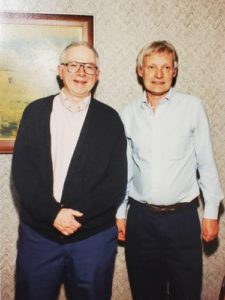“I found my voice”

.
The voice is something a serious writer is looking for; it is the gestalt of his language gestures; it distinguishes her from other writers. The voice, then, is all we are after, without mentioning it hardly ever in our writers’ group. The voice as a separate spiritual embodiment of a person appears in the Little Mermaid, but there it comes first naturally attached, then it is stolen by Ursula the witch, and finally reunited with the unhappy owner.
I became aware of the significance of the voice in my group when a group member, over a beer, confided to me that he had found hers. His manuscript had been accepted by a journal of note, and she was beaming with the future that was opening up in front of him. Among her first actions was to quit our group. I imagined all the members of the group stumbling through the wilderness and he, stumbling with the rest, had run unto something she recognized as his own. Now there was no use stumbling on.
I contemplated the semantic implications of the phrase “I found my voice.” Clearly, this cannot refer to the Little Mermaid scenario where the voice was lost or stolen, since the word “again” is missing. Rather, it implies that for every human on earth there exists something disconnected out there, something akin to a shadow, a sound, a gesture, that is predestined and unique. This something is hidden or obstructed or placed far away from the owner, in an unknown locale. For all those who bother to strife, it is a prize to be found, a prize to be instantly recognized and swallowed to become part of us, and share a room with our soul as it were. (Once confronted, the recognition between the voice and its legitimate owner is of course instant; all it takes is that the owner opens his mouth, and in slips his voice, just like in the Little Mermain cartoon).
The image that formed in my head was of the globe covered with little dots representing persons and little flags representing their voices, with lines connecting the dots with the little flags, billions of such curved geodesic lines forming a fuzzy cover of the earth. And just for a lucky few, the flags were posted on the dots, with no lines in between.
The other image that comes to mind is of the man who lost her shadow. In fact, he sells it, to find herself restless until he can reclaim it after years of struggle. The voice, the shadow, the soul – a trinity of metaphors for the gestalt of a woman in its infinite complexities. I’m trying to imagine a conversation, over a beer, with someone who confides to me that he has found his shadow, or his soul. The beer is spiced with a few drops of sulfuric acid.
.
.[I found my speech (not my voice) recently in a booklet of photographs I put together after the 20th anniversary of our Albany writers’ group, which started in 1985 with Gene Garber’s fiction writing course at SUNY Albany. I found myself irritated by the conundrum posed by the references to genders when referring to the generic “writer”, so in this version I simply alternated between he and she, and him and her, and his and hers.]
.
.

(with Gene Garber at the 20th reunion of our writers’ class)
To this Gene Garber objected and replied with this vastly different interpretation:
“Joachim,
Thanks for this. Here is my simplistic version of this complex matter. First you have a being. Some would call it a soul. But whatever, the deepest core of who you are. That being manifests certain qualities that we call a personality for want of a better term. On these foundations we erect an identity, which successfully places us in society–a black immigrant politician. At this point the flexible and deft person like you sees that he can now actually build new imaginative personas. He probably lands on one that fits the stuff below. He discovers that that persona has a distinct voice. The persona named Frank, a name that appears on his fictive productions, is thus an entity built on foundations but not the same as any of them. In short, finding one’s voice really means inventing it from a set of limited possibilities. And, whatever your beer drinking buddies might say, you don’t have to have one persona and one “found” voice. I have a lot. You certainly have more than one–from your Kafkaesque days to your confinement in Austria.
Gene”
I stand corrected; the globe collapses under this scrutiny, and instead I need to erect Gene’s conceptual edifice in my mind to do justice to the matter, an edifice which is vertical rather than horizontal, with tree-like multi-furcations at the bottom standing for my avatars, each with hisher own voice:
–being (soul), the deepest core
–manifests qualities we call “personlity”
–on this we erect an identity
–anchored like this, in turn, we are able to build artificial personas
–each of those has a distinct invented voice
.
.

Leave a Reply